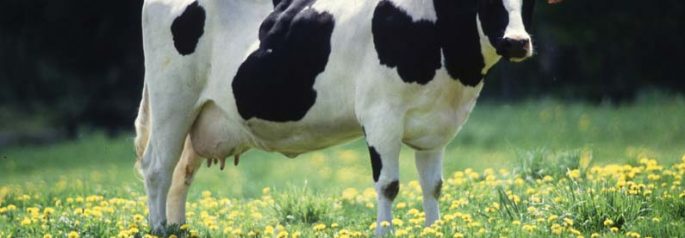
Dear John,
For years our milkman (Alta Dena Dairy) has been delivering “milk from cows not treated with rBST.” You mention rBGH in your book. What is the difference between these two? Thanks for a great book.
Lucy
Dear Lucy,
Recombinant Bovine Somatotropin (rBST) is another name for recombinant Bovine Growth Hormone (rBGH).
By whatever name it’s called, rBGH is a genetically engineered variant of the natural growth hormone produced by cows. For some time, natural bovine growth hormone (BGH) has been used to stimulate milk production in cows. The hormone was too expensive for widespread use, however, until Monsanto came up with a genetically altered hormone (called rBGH or rBST). This genetically engineered hormone, sold by Monsanto under the brand name Posilac, is now injected into more than a quarter of the cows in U.S. dairies.
There is no controversy about whether rBGH increases milk production. It does. But there are other points of contention. For one thing, the need for the technology has been questioned, because since 1950 U.S. dairy farmers have been producing vastly more milk than Americans can consume. In fact, in 1986-1987, the federal government paid farmers to kill their cows and stop dairy farming for five years, in an effort to reduce the amount of milk produced. More than 1.5 million U.S. milk cows were slaughtered. Even this drastic program, however, did not solve the problem of milk overproduction in the United States.
Another issue is that milk from cows that have been injected with Monsanto’s genetically engineered rBGH contains 2 to 10 times as much IGF-1 (insulin-like growth factor) as normal cow’s milk. This is significant, because studies have found the risk of prostate cancer for men over 60 years of age with high levels of IGF-1 to be eight times greater than for men with low levels. And the risk of breast cancer for premenopausal women with increased blood levels of IGF-1 to be up to seven times greater.
Consultants paid by Monsanto say that milk from injected cows is absolutely safe for human consumption because IGF-1 is destroyed by pasteurization. FDA researchers, on the other hand, report that IGF-1 is not destroyed by pasteurization.
Monsanto also says the hormone is safe because IGF-1 is completely broken down by digestive enzymes and does not enter the human intestinal tract. But researchers not paid by Monsanto say that IGF-1 may not be totally digested, and that some does make its way into the colon and cross the intestinal wall into the bloodstream.
Meanwhile, cows treated with the genetically engineered hormone have a 25 percent increase in udder infections (mastitis) and a 50 percent increase in lameness. To counter the health problems among cows injected with rBGH, Monsanto suggests a greater use of antibiotics. As it just so happens, the company also sells the very antibiotics it recommends.
Polls show that American consumers overwhelmingly support the labeling of milk produced with rBGH. But the FDA has said such labeling would unfairly stigmatize rBGH milk as less healthy. The FDA official responsible for this policy is Michael R. Taylor, whose occupation prior to joining the FDA was as a partner in the law firm representing Monsanto when it applied for FDA approval for rBGH. His employer after he left the FDA, by the way, was Monsanto.
Monsanto’s track record in these matters tends to be a tad shady. During Canada’s scientific review of Monsanto’s application for approval of rBGH, Canadian health officials said Monsanto tried to bribe them, and government scientists testified that they were being pressured by higher-ups to approve rBGH against their better scientific judgment. Canada’s policies have been almost as ardently pro-biotech as those of the United States, but in 1999, Canadian health authorities, after eight years of study, rejected Monsanto’s application for approval of rBGH. In so doing, Canada joined the European Union, Japan, Australia, and New Zealand, all of whom have banned rBGH because of scientific health concerns.
In the United States, however, milk produced with the genetically engineered hormone is not only legal, it is also not labeled. And it is not only not labeled, but Monsanto has fought to make it impossible to reveal, truthfully, when it’s not in milk.
When several companies that produced milk without rBGH, including the Pure Milk Company of Waco, Texas, and Swiss Valley Farms of Davenport, Iowa, factually advertised their milk as rBGH-free, Monsanto’s response was to sue these companies, forcing then to refrain from telling their customers the truth.
Monsanto’s actions and ensuing lawsuit represent a new twist in libel litigation. For the first time, telling the truth was contended to be objectionable. Monsanto claimed that a statement of actual truth could be false advertising, because actual facts could induce consumers to believe that Monsanto’s product was less than exemplary, and thereby cost the company money.
Currently, neither milk made with rBGH nor any other genetically engineered food product in the United States, is labeled.
Yours for healthy food and a healthy way of life,
John

